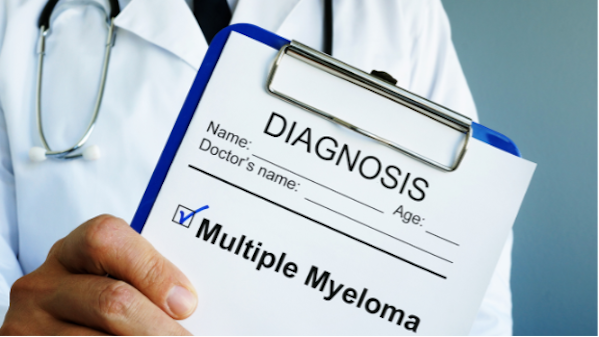Phase 3 Trial for GSK’s Blenrep Yields Positive Results in Relapsed or Refractory Multiple Myeloma
December 2, 2023
Source: drugdu
 289
289
Don Tracy, Associate Editor
Blenrep significantly extended the time to disease progression or death against existing care methods as a second-line treatment for relapsed or refractory multiple myeloma.
 GSK announced positive results from an interim analysis of its DREAMM-7 head-to-head Phase 3 trial evaluating belantamab mafodotin (Blenrep) as a second-line treatment for relapsed or refractory multiple myeloma. According to a company press release, the trial met its primary endpoint of progression-free survival (PFS) and showed that Blenrep when combined with bortezomib plus dexamethasone (BorDex) significantly extended the time to disease progression or death versus daratumumab plus BorDex, an existing standard of care for relapsed/refractory multiple myeloma.1
GSK announced positive results from an interim analysis of its DREAMM-7 head-to-head Phase 3 trial evaluating belantamab mafodotin (Blenrep) as a second-line treatment for relapsed or refractory multiple myeloma. According to a company press release, the trial met its primary endpoint of progression-free survival (PFS) and showed that Blenrep when combined with bortezomib plus dexamethasone (BorDex) significantly extended the time to disease progression or death versus daratumumab plus BorDex, an existing standard of care for relapsed/refractory multiple myeloma.1
“Patients with multiple myeloma need treatment options after first relapse that are efficacious, readily accessible and have novel mechanisms of action,” said Hesham Abdullah, SVP, global head, oncology, R&D, GSK, in a press release.1 “We are particularly encouraged by the potential for belantamab mafodotin when combined with BorDex to address high unmet need in relapsed/refractory multiple myeloma, given the head-to-head comparison with the daratumumab-based standard of care regimen.”
Multiple myeloma, a malignant disorder of B cells, is the second most common hematological cancer and is associated with significant morbidity and mortality. Survival rates for the disease have improved over the past few decades because following the launch of promising new targeted treatments and combination therapies; however, most patients with multiple myeloma relapse, including patients who achieved remission.2
Initially, Blenrep had been removed from the market in November of last year following a request from the FDA. According to the International Myeloma Foundation, the request was based upon the previously announced outcome of the DREAMM-3 Phase 3 confirmatory trial, which did not meet the requirements of the FDA Accelerated Approval regulations. Despite the setback, GSK continued its clinical testing of the therapy, hoping to explore its potential further.3,4
Currently, Darzalex, Johnson & Johnson’s (J&J) multiple myeloma treatment, is considered the standard of care treatment in the industry. Based on results of the DREAMM-7 trial, GSK believes Blenrep shows potential as a much stronger treatment, with the study reportedly showring superior results compared to its counterpart.4
DREAMM-7 was a Phase 3, multicenter, open-label, randomized trial analyzing the efficacy and safety of Blenrep plus bortezomib and dexamethasone (BorDex) compared to a combination of daratumumab and BorDex in patients with relapsed/refractory multiple myeloma previously administered at least one prior line of treatment for multiple myeloma, with documented disease progression during or following the most recently administered therapy.
The investigators randomly assigned 494 patients 1:1 ratio to receive either Blenrep plus BorDex or a combination of daratumumab and BorDex. Blenrep was dosed at 2.5mg/kg intravenously every three weeks.1
GSK stated that its DREAMM clinical development program will evaluate the potential of Blenrep in early lines of treatment and in combination with novel therapies and standard of care treatments. This includes the ongoing head-to-head Phase 3 DREAMM-8 trial evaluating Blenrep in combination with pomalidomide and dexamethasone versus bortezomib in combination with pomalidomide and dexamethasone. More data are expected in the second half of 2024, according to GSK.1
Read more on
- The first subject has been dosed in the Phase I clinical trial of Yuandong Bio’s EP-0210 monoclonal antibody injection. February 10, 2026
- Clinical trial of recombinant herpes zoster ZFA01 adjuvant vaccine (CHO cells) approved February 10, 2026
- Heyu Pharmaceuticals’ FGFR4 inhibitor ipagoglottinib has received Fast Track designation from the FDA for the treatment of advanced HCC patients with FGF19 overexpression who have been treated with ICIs and mTKIs. February 10, 2026
- Sanofi’s “Rilzabrutinib” has been recognized as a Breakthrough Therapy in the United States and an Orphan Drug in Japan, and has applied for marketing approval in China. February 10, 2026
- Domestically developed blockbuster ADC approved for new indication February 10, 2026
your submission has already been received.
OK
Subscribe
Please enter a valid Email address!
Submit
The most relevant industry news & insight will be sent to you every two weeks.



